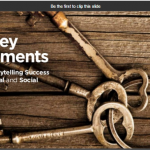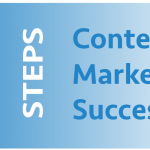This is an exciting time for brands, companies, non-profits and organizations. There is so much data available to us. We can now know more about our customers and potential customers than ever before. We can know there wants, needs, desires, motivations, where they are, where they go, what they like. But all of that means nothing if we don't connect with them in a way that moves them to act. This is why storytelling has become a big topic.
What's the difference between a dry lecture by a boring professor and a Ted Talk? It's all in the storytelling. It doesn't matter how much data you have, how impressive your facts are… if you can't make me care about the story, preferably one that involves me. As humans, we need to know why we should care. What's in it for me? How can I relate to it? Is it emotionally gratifying? Does it give me a reason to act now? Those are the questions that only good storytelling can tell.
Good storytelling helps you stand out in the crowd. With more and more messages bombarding us every day, telling a good story becomes more important. We see hundreds of brand messages every day, everywhere we go. Our attention spans are getting shorter as we multitask on multiple screens. A good story can make us stop for a moment and pay attention. In order for brands to even register in consumers minds today, they need to be good storytellers.
Good storytelling can help convey messages that would be difficult to tell otherwise. Not too long ago we worked with a hospital system. After a year of research and corporate culture analysis, we had some amazing data. One data point was that their payor mix was out of whack. In short, they were taking on too many people without insurance. The data said service less poor people. That's not a message that will resonate with anyone. And besides, you have to take care of them. The solution was in crafting the right stories. The stories we told were ones that would appeal to people on the higher end of the social economic scale. And it worked, we attracted more people with insurance and the payor mix righted itself.
Good storytelling builds communities and referrals. Being able to connect with the right people to build the kind of community around your brand means knowing what's important to them and creating the right stories that will band them together under a common theme. One of our clients depends on cooperation with local first responders in each market they're in. By having the data that tells us what kinds of stories bond this community together, we're able to do just that through our social media channels. So, when we were opening up a new location in a new city, our community helped the new Facebook page for that location get 10,000 likes in one weekend, thanks to the strong community helping us tell our story.
Good storytelling can sell products. Telling the right story isn't just for brands and building communities in social media, it can make the difference in selling a product. We have a number of furniture retailers as clients and simply telling customers about great deals does work. But when you can wrap it in a good story, it works better. Telling them about the manufacturer who got stuck with a huge cancelled order and we bought it all for pennies on the dollar and passed the savings on to you works much better than just telling the customer she's saving X%. Or that the huge snowstorm shut down one of your biggest sales, leaving you with excess goods that must be sold now. A good story lets the customer know the reason behind the savings and legitimizes them. And that moves more people that simple facts.
Whether it's speeches, presentations, marketing or internal communications, having great data only helps if it helps you shape the right story for the right audience. So, heard any good stories lately?
Mike McClure, always looking for a good story.






